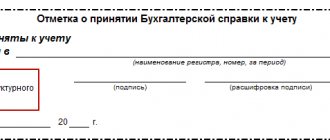The work of the chief accountant and the company's results
Any business process in an organization has a financial side. Therefore, the activities of accounting concern absolutely all aspects of the company’s work.
Whether the company will develop successfully or whether it will face serious problems largely depends on the professionalism of the chief accountant. The cost of an accountant's mistake is much higher than company owners and managers believe. Often this becomes obvious too late, for example, when the Federal Tax Service has sent additional charges, the amount of which threatens the existence of the business in general.
And we are talking here not only about errors in accounting reports or tax calculations. Settlements with counterparties and credit institutions are also under the control of the chief accountant.
Accountant's responsibility for tax offenses
Delays in payments under contracts can lead to problems in relationships with the company’s partners. And if we are talking about international payments, then significant penalties are provided for violations of payment deadlines and the procedure for processing documents.
If an organization has received a bank loan, then delays can lead to financial losses, and in some cases, to the loss of assets pledged as collateral.
What should the chief accountant do?
The chief accountant is directly subordinate to the director of the business entity. He is at the head of the accounting department, controls the maintenance of accounting records and the creation of accounting (financial) statements. The area of his responsibility is determined by legal regulations, employment contracts and job descriptions.
The requirements for the professionalism of the chief accountant largely depend on the size of the company and the nature of its work. If the company is small and does not have a commercial director, the chief accountant is the only person responsible for finances. Therefore, in addition to accounting, he is responsible for conducting financial analysis, calculating the budget for future projects, and managing cash flows.
At large enterprises with a developed financial department, the chief accountant does not have to take responsibility for creating accounting policies and financial analysis of the company's work, since this is done by the financial director. The relationship between the director and the chief accountant is coordinated by labor legislation. This suggests that any obligations of the chief accountant must be recorded in the employment contract. With the help of a job description, his responsibilities can only be clarified, but not expanded.
Basic requirements for chief accountants
The basic document regulating accounting in the Russian Federation is the law of December 6, 2011 No. 402-FZ “On Accounting”. The chief accountants did not go unnoticed by the drafters of this regulatory act.
Article 7 of the basic accounting law contains the requirements for the chief accountant:
- higher education;
- work experience in the specialty;
- no criminal record on economic charges.
Interestingly, the law does not require higher education specifically in accounting and auditing specialization.
If the education is non-core, then this is compensated by increased requirements for professional experience: five years out of the last seven. At the same time, a candidate who has graduated from a university with an accounting major only needs three years of experience over the last five years.
However, the law establishes the above requirements for the head of the accounting service only for certain categories of organizations:
- joint stock companies;
- Insurance companies;
- funds;
- organizations whose securities are traded on an exchange.
There are also specific areas of business, the requirements for which are established by separate laws.
An example would be the financial sector. Article 16 of Law No. 395-1 dated December 2, 1990 “On Banks and Banking Activities” specifies the requirements for top managers of credit institutions.
In particular, a candidate for the position of chief accountant of a bank must, in addition to higher education, also have at least a year of work experience in financial institutions. There are also additional reputational requirements for such a specialist.
For example, the chief accountant of a bank should not have an outstanding conviction for intentional crimes. Also, during the previous 10 years, he must not have been involved in the management of bankrupt credit institutions or those that were deprived of their license.
So, at the level of federal laws, the requirements for the chief accountant are not established for all companies.
It turns out that in an ordinary LLC, not related to financial and other “special” areas, anyone can work as a chief accountant? But in addition to federal laws, requirements for financial specialists are also established by other lower-level regulations.
Let's look at them in chronological order.
More details
Roles and Responsibilities
The chief accountant of an economic entity is assigned the following functions:
- Management of accounting and reporting;
- Control over the competent creation of accounting documents;
- Development of an accounting policy for a business entity and specific measures for its implementation;
- Methodological support for employees on the topic of accounting and reporting;
- Control over the creation of salary calculations, tax deductions to budgetary organizations, payments to banks;
- Identification of internal reserves of the enterprise, development and implementation of measures to eliminate losses;
- Introduction of advanced computer technologies into the work of the accounting department;
- Providing favorable working conditions for accounting employees.
To perform the functions assigned to him, the chief accountant is obliged to:
- Organize accounting in the company, in accordance with its structure and nature of activity;
- Rationalize accounting based on the use of advanced information technologies and progressive accounting methods;
- Monitor the literacy of processing accounting documents, carrying out inventories, etc.;
- Carry out accounting policies taking into account the structure and nature of the business entity’s activities, organize the timely provision of financial statements;
- Organize strict adherence to financial and cash discipline, protection of documentation and its transfer to the archive;
- Provide accounting and reporting data for filing tax returns to the person responsible for tax deductions, submit tax returns and other necessary documentation to the tax authorities on time;
- Draw up summary reports on the activities of a business entity and the use of budget funds and submit them to regulatory authorities within the established time frame;
- Participate in the implementation of economic analysis of the company’s activities based on accounting and reporting information to unlock the internal potential of the organization and eliminate unnecessary losses;
- Manage accounting specialists.
Requirements for chief accountants in the legislation of the USSR
Clause 5 of the Regulations, approved by Resolution of the USSR Council of Ministers dated May 24, 1980 No. 59, establishes mandatory requirements for the chief accountant of higher specialized education.
True, it also contains a caveat that, by decision of a higher organization and if you have three years of professional experience, this requirement may not be met. Who in modern conditions can be considered a superior organization for a commercial company remains unclear.
However, this question is no longer relevant today. The Supreme Court, dated October 22, 2014 No. AKPI14-965, ruled that clause 5 of Regulation No. 59 should be considered invalid. The judges pointed out that federal legislation does not contain general requirements for the education of a chief accountant. Therefore, a document that contradicts higher-level regulations should not be used.
And soon after the above-mentioned verdict of the RF Supreme Court, Regulation No. 59 was declared ineffective in its entirety (RF Government Resolution No. 362 dated May 16, 2015).
An accountant is an employee or worker
An elected position (even for fun like Luzhko and Matvienko) is not a civil servant, such people are only hired. category "haulers" He belongs to the highest category of corrupt officials!:) In China, people like Luzhkov are publicly shot. In our country, the Luzhkovs get the highest positions in the state apparatus so that they can steal more! :) The mayor (French Maire, English mayor, that is, foreman) is the head of the administration, the head of the executive power of a settlement, most often a city, in some countries - and a small region, for example in Lithuania the mayor also heads district governments. The name of the position comes from the Latin word “maior”, meaning “large”, “great”. In Russia, the title of the position took root in the 1990s more as a short replacement for the expression “city mayor,” “head of the city administration,” or “head of the city executive committee.” At the same time, the position of “mayor” was introduced at the official level.
These salary schemes were developed on the basis of a number of regulatory documents, in particular the Qualification Handbook. Is it just a “bare” salary? In addition to fixed salary amounts, there is a system of additional payments, allowances and various bonus payments. Such employees are rewarded in connection with an increase in production output and a reduction in its cost, compliance with contractual obligations, an increase in labor productivity, and savings in raw materials and fuel.
The administration of the enterprise independently determines certain indicators and bonus conditions. If the quality of manufactured products deteriorates or other negative factors are identified, premiums may not be paid. Certain types of additional payments related to combining positions or professions, increasing the volume of work or expanding the service area are established in addition to the salaries of engineers at the discretion of management.
According to the UNDS, managers are classified depending on the object of management: - heads of organizations (in their legal concept provided for by the Civil Code of the Russian Federation); - heads of services and divisions in organizations. Managers also include their deputies. Specialists are classified depending on the nature of the functions they perform or areas of activity: - specialists engaged in engineering, technical and economic work; - specialists engaged in agricultural, zootechnical, fish farming and reforestation work; - specialists engaged in medical care, public education, as well as workers in science, art and culture; - specialists those employed in international relations; - specialists in legal services. As can be seen, the number of specialists included workers engaged in both economic and engineering work.
- Head of Public Relations Department
- Sales Manager
- Head of Social Development Department
- Head of Standardization Department
- Head of Planning and Economic Department
- Head of Production Department
- Head of the repair shop
- Shift Supervisor
- Head of Technical Department
- Head of Financial Department
- Head of economic department
- Head of the central plant laboratory
- Head of workshop (section)
- Head of pilot production workshop
- Head of the legal department
- Work foreman (foreman)
- Head of the group for inventory of buildings and structures
- Department manager (farm, agricultural plot)
Requirements for chief accountants in Russian legislation
Already in modern Russian legislation, the qualification requirements for the chief accountant were established in the directory of positions (Resolution of the Ministry of Labor of the Russian Federation dated August 21, 1998 No. 37). The document requires the applicant for the position of chief accountant to have a higher education. In addition, at least five years of financial experience is required, including work in management positions.
Over the past few years, professional standards have been actively introduced in various fields of activity in the Russian Federation. The general procedure for their development was approved by the Government of the Russian Federation dated January 22, 2013 No. 23. Each professional standard includes the qualification requirements necessary to perform official duties in a specific specialty.
Today, the “Accountant” standard has also been developed. It was prepared by the Institute of Professional Accountants and Auditors of the Russian Federation and approved by order of the Ministry of Labor of the Russian Federation dated October 22, 2014 No. 1061n.
Important!
The difference between the professional standard “Accountant” and the documents discussed above is that not only higher, but also secondary vocational education is allowed for the chief accountant. In addition, the new requirements stipulate that the chief accountant must improve his qualifications by studying in specialized programs.
As for length of service, the standard completely repeats the requirements of Article 7 of Law No. 402-FZ: three out of the last five years if you have a specialized higher education and five out of seven years if you don’t have one.
The use of professional standards is regulated by Art. 195.3 Labor Code of the Russian Federation. Only those that are confirmed by other regulations are mandatory for use.
And as shown above, the law does not contain generally accepted mandatory requirements for chief accountants of all organizations.
Consequently, the professional standard “Accountant” for most companies today is of a recommendatory nature.
Introduction of professional standards.
As noted, at the beginning of 2020, government institutions, as well as other state and municipal institutions, had to implement action plans for the implementation of professional standards: to establish, in particular, whether the requirements of professional standards are mandatory for employees of their organization, including chief accountants , conduct an analysis of the professional qualities of employees for compliance with these requirements, and also draw up plans for employee training and additional professional education within the budget for the corresponding year. The Ministry of Labor reminded us of this back in 2020 (Letter dated 04/04/2016 No. 14-0/10/B-2253).
For chief accountants of government institutions, the qualification requirements established by the professional standard are recommendations. However, if the employer is interested in competent employees, he can apply professional standards when developing job descriptions, recruiting personnel, organizing training, certification, etc. Accordingly, he can include in the job description of the chief accountant the knowledge, skills and functions established by the standard, as well as qualification requirements.
After changes are made to the job description, new employees will need to be hired in accordance with these requirements.
Using professional standards when searching for a chief accountant
So, for ordinary organizations, mandatory general requirements for the chief accountant have not been established today. Therefore, the dismissal of such a specialist, for example, only because of the lack of a diploma, will be illegal.
An example is decision No. M-1207/2013 dated November 1, 2013 of the Mirninsky District Court of the Republic of Sakha (Yakutia). The judges pointed to the advisory nature of the qualification requirements for the chief accountant for organizations that do not belong to particularly significant categories.
But if in many cases it is impossible to fire a chief accountant who does not have a diploma, then it is quite possible to refuse such an applicant a job. Even if the requirements for professional standards are not mandatory for a particular organization, it can develop internal regulations based on them.
When a company posts information about a vacancy, it is necessary to provide as detailed information as possible both about the position itself and about the requirements for candidates. This will make it possible to make a primary selection before the applicant contacts the company and reduce the burden on the HR service.
How to find a good accountant for an LLC
If the selection of an employee is carried out through a recruitment agency, then the requirements and responsibilities should also be listed in detail in the order. This will reduce the risk of misunderstanding between the customer and the agency, and only specialists who fully meet its needs will come to the final interviews with the company.
The professional standard “Accountant” contains not only general requirements (education, experience), but also a list of special knowledge and skills.
As you can see, the list is quite detailed. Based on this, an organization can develop its own regulations, taking into account the specifics of doing business and organizing accounting.
In addition to the requirements for the job of a chief accountant, it is useful to include in the job description a list of the applicant’s personal qualities:
- Honesty and integrity. It is clear that the employer by default wants to see these qualities in any employee. But if we are talking about the head of the financial service, then their importance increases many times over. After all, a malicious chief accountant can create very serious problems for a company and even threaten the very existence of the business.
- Responsibility and discipline. Here, too, everything is clear: accounting work is associated with the need to constantly comply with various deadlines (payments, paperwork, reporting, etc.).
- Analytic mind. The chief accountant often has to solve non-standard problems under time pressure. Therefore, he must be able to quickly understand a new problem and find the optimal solution.
- Precision, even reaching the point of pedantry. This quality will allow you to carry out all necessary operations without errors and in full compliance with the requirements of the law.
- Stress resistance. The chief accountant constantly has to “resolve issues” when interacting with other services, counterparties, regulatory authorities, etc. Therefore, he must be able to withstand serious psychological stress without losing performance.
- Patience, perseverance. Working with numbers can sometimes be boring and monotonous. But this should not affect its intensity and final result.
An accountant is a worker or employee
Managers include employees holding positions of heads of enterprises and their structural divisions.
Managers, in particular, include directors, managers, managers, chief specialists and others. Specialists include workers engaged in engineering, technical, economic and other work, in particular agronomists, administrators, accountants, engineers, standard setters, economists, energy experts, legal advisers and others. Employees include workers involved in the preparation and execution of documentation, accounting and control, and business services, in particular agents, archivists, attendants, clerks, cashiers, secretaries-typists, statisticians, stenographers, accountants, and draftsmen. Large accounting dictionary. — M.: Institute of New Economics. Edited by A.N. Azriliyana. What category do accountants and economists belong to? Some documents say that these are specialists, while others say that they are employees. Which is correct? The positions of economists and accountants (just like the positions of engineers and a number of other positions) can be classified as both employees and specialists. It would be more correct to say that these are specialists from among the employees.
This definition, which is so strange at first glance, is explained by the fact that the category “employees” is opposed not to “specialists”, but to “workers”. The category “employees” itself is divided into three parts: - managers - specialists - other employees (technical performers).
Managers include employees holding positions of heads of enterprises and their structural divisions. The position in OKPDTR, which has a category code of 1, refers to managers. Managers, in particular, include: directors (general directors), chiefs, managers, managers, chairmen, commanders, commissars, foremen, work performers at enterprises, structural units and divisions; chief specialists: chief accountant, chief dispatcher, chief engineer, chief mechanic, chief metallurgist, chief welder, chief agronomist, chief geologist, chief electrician, chief economist, chief researcher, chief editor; state inspectors.
The category of managers also includes deputies for the positions mentioned above. 35.







